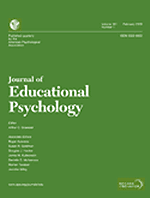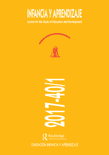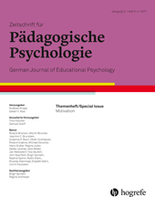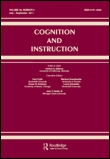
JOURNAL OF EDUCATIONAL PSYCHOLOGY
Scope & Guideline
Elevating Educational Psychology to New Heights
Introduction
Aims and Scopes
- Educational Psychology Research:
The journal emphasizes empirical research that explores cognitive, emotional, and motivational processes in educational settings, contributing to the understanding of how these factors affect learning outcomes. - Interventions and Practical Applications:
A core focus is on developing and evaluating interventions aimed at improving educational practices, student engagement, and overall academic performance. - Diversity and Inclusion:
The journal addresses issues of diversity in education, including studies on multicultural classrooms, special educational needs, and the impact of socio-economic factors on learning. - Longitudinal and Developmental Studies:
Research often employs longitudinal designs to track changes over time, providing insights into the developmental trajectories of students' academic skills, motivation, and emotional well-being. - Teacher-Student Dynamics:
There is a strong emphasis on the dynamics within teacher-student relationships and their influence on student learning, motivation, and emotional responses. - Technological Integration in Education:
The journal explores the role of technology in educational settings, assessing its impact on learning processes, engagement, and educational outcomes. - Cognitive and Affective Learning Processes:
It investigates how cognitive processes (like working memory and problem-solving) and affective factors (like anxiety and motivation) interact to influence educational experiences.
Trending and Emerging
- Resilience and Coping Mechanisms:
Recent studies increasingly focus on resilience and coping strategies among students, particularly in the context of challenges such as the COVID-19 pandemic, emphasizing the importance of mental health and well-being in education. - Digital Learning and Technology Integration:
The rise of digital education has led to a surge in research exploring the effectiveness of online learning environments, digital tools, and their impact on student engagement and learning outcomes. - Social-Emotional Learning (SEL):
Emerging themes around social-emotional learning highlight its critical role in fostering student engagement, academic success, and overall well-being, reflecting a broader trend towards holistic education. - Culturally Responsive Education:
There is an increasing emphasis on culturally responsive teaching practices that address diversity and inclusivity in educational settings, acknowledging the varied backgrounds and needs of students. - The Role of Teacher Well-Being:
Research on teacher well-being and its impact on student outcomes is gaining traction, recognizing the reciprocal relationship between teacher health and student learning experiences. - Machine Learning and Data-Driven Approaches:
The use of machine learning and advanced data analytics in educational psychology research is emerging, facilitating new insights into learning patterns and student behaviors. - Parent Involvement and Family Dynamics:
Increasing attention is being paid to the role of parental involvement and family dynamics in student achievement, highlighting the interconnectedness of home and school environments.
Declining or Waning
- Traditional Assessment Methods:
There is a noticeable decline in studies focusing solely on traditional assessment methods, such as standardized testing, as the field shifts towards more holistic and formative assessment approaches. - Static Models of Learning:
Research that relies on static models of learning and development is becoming less common, with a growing preference for dynamic, contextualized approaches that consider the interplay of various factors over time. - Single-Domain Focus:
Papers concentrating exclusively on single domains of psychology or education (e.g., only cognitive or only emotional factors) are increasingly rare, as interdisciplinary approaches that integrate multiple perspectives gain traction. - Generalized Conclusions from Small Samples:
The trend of drawing broad conclusions from studies with limited sample sizes is diminishing, as there is a greater emphasis on robust, large-scale studies that enhance the generalizability of findings. - Overemphasis on Negative Outcomes:
There is a waning focus on solely negative outcomes associated with educational experiences (such as dropout rates and academic failure), with more research now examining resilience, positive psychology, and strengths-based approaches.
Similar Journals

PSYCHOLOGIE IN ERZIEHUNG UND UNTERRICHT
Transforming education with innovative psychological research.PSYCHOLOGIE IN ERZIEHUNG UND UNTERRICHT, published by ERNST REINHARDT GMBH CO VERLAG, serves as a pivotal platform for research in the fields of Developmental and Educational Psychology. Since its inception, this esteemed journal has focused on disseminating groundbreaking insights and innovative practices from 1996 to the present, with expectations to continue through 2024. Despite its current ranking of Q4 in category quartiles and a Scopus rank of #309 out of 360, the journal remains a crucial resource for scholars, educators, and practitioners seeking to enhance their understanding of psychological principles within educational contexts. Situated in the vibrant academic landscape of Germany, the journal emphasizes both theoretical and practical perspectives, motivating interdisciplinary discussions that are vital in addressing contemporary challenges in education and human development. As the journal continues to evolve, it invites contributions that explore emerging trends, providing a rich source of information for both researchers and professionals dedicated to improving educational outcomes through psychological insights.

Journal for the Study of Education and Development
Exploring the intersection of learning and growth.The Journal for the Study of Education and Development, published by SAGE Publications Inc, is a leading academic peer-reviewed journal dedicated to advancing knowledge in the fields of educational and developmental psychology. Established in 1978 and operating through the United Kingdom, this journal provides a platform for contemporary research, theoretical discussions, and critical reviews that inform practices and policies in education. With an H-index reflecting its impact and citation metrics, it ranks in the Q3 category for both Developmental and Educational Psychology and Education as of 2023. Notably, it holds a Scopus rank of #722/1543 in Social Sciences - Education and #218/360 in Psychology - Developmental and Educational Psychology, placing it in the 53rd and 39th percentiles, respectively. The journal is committed to open access, ensuring that the insights found within its pages are readily available to researchers, professionals, and students alike. By contributing to ongoing dialogues and innovations in educational contexts, the Journal for the Study of Education and Development remains an essential resource for those looking to foster growth and development in educational settings.

International Journal of Educational Psychology
Unlocking the Potential of Learning through PsychologyInternational Journal of Educational Psychology, published by HIPATIA PRESS, is a premier platform for innovative research in the fields of educational and developmental psychology. With an impact factor reflecting a growing presence in the academic community, this Open Access journal has been delivering peer-reviewed studies since its inception in 2012, facilitating worldwide accessibility and collaboration. Based in Barcelona, Spain, this journal focuses on advancing knowledge and practice in educational psychology, providing insights for educators, researchers, and practitioners alike. As it converges through the years from 2018 to 2024, the journal proudly holds a Q3 quartile ranking in both Developmental and Educational Psychology and Education categories, highlighting its dedication to impactful scholarship. By engaging with the latest findings and fostering critical discussions, the International Journal of Educational Psychology aims to enhance educational practices and inform policy making, thus shaping the future of psychology and education.

ZEITSCHRIFT FUR PADAGOGISCHE PSYCHOLOGIE
Bridging theory and practice in pedagogical psychology.ZEITSCHRIFT FUR PADAGOGISCHE PSYCHOLOGIE, published by HOGREFE AG, is a vital resource in the field of Developmental and Educational Psychology, focusing on the interplay between psychological principles and educational practices. With an ISSN of 1010-0652 and an E-ISSN of 1664-2910, this esteemed journal has been at the forefront of academic dialogue since its inception in 1996 and continues to contribute significantly to the discipline through 2024. It holds a respectable Q3 ranking within its category, highlighted by its position in the 57th percentile among developmental and educational psychology journals in Scopus. Although it is not an Open Access journal, it remains highly regarded for its comprehensive coverage of empirical research, theoretical contributions, and practical implications relevant to educators and psychologists alike. This journal not only fosters the advancement of research but also provides actionable insights that inform effective educational strategies, making it an essential read for scholars, practitioners, and students eager to engage with the latest findings in pedagogical psychology.

Journal of Educational Cultural and Psychological Studies
Fostering Knowledge in Developmental and Educational PsychologyJournal of Educational Cultural and Psychological Studies is a prominent academic journal published by EDIZIONI UNIV LETTERE ECONOMIA DIRITTO-LED, dedicated to exploring the intricate interplay between education, culture, and psychological processes. Since its inception as an Open Access journal in 2010, it has been committed to disseminating high-quality research that contributes to the fields of Developmental and Educational Psychology, Education, and Social Psychology, achieving Quartile 4 rankings in these categories as of 2023. With an ISSN of 2037-7932 and E-ISSN 2037-7924, the journal operates from Milan, Italy, providing a platform for researchers, professionals, and students to engage with innovative theories and empirical findings. Although the journal currently ranks within the lower percentiles in Scopus metrics, it holds significant potential for growth and influence in the academic landscape, particularly in the rapidly evolving domains it covers. Scholars can access the journal’s articles freely to foster a broader understanding of topics critical to cultural and psychological education, making it an essential resource for anyone interested in advancing their knowledge and research in these interdisciplinary areas.

COGNITION AND INSTRUCTION
Bridging theory and practice in cognitive education.COGNITION AND INSTRUCTION is a premier scholarly journal dedicated to advancing the understanding of cognitive processes in educational contexts. Published by Routledge Journals, Taylor & Francis Ltd, this journal plays a pivotal role in the fields of psychology and education, boasting a significant impact factor and ranking in the top quartile (Q1) across various psychological and educational categories, including Applied Psychology and Developmental and Educational Psychology. With a publication history stretching from 1984 to 2024, the journal serves as a critical resource for researchers, educators, and practitioners seeking to bridge theory and practice in teaching and learning. It provides a platform for high-quality research, focusing on the interplay between cognition and instructional practices, thereby fostering innovation in educational methodologies. Although currently not an Open Access journal, COGNITION AND INSTRUCTION ensures that cutting-edge findings and discussions are readily accessible to the global academic community, enhancing knowledge sharing and collaboration among scholars.

International Journal of School & Educational Psychology
Cultivating Knowledge in Educational and Developmental PsychologyThe International Journal of School & Educational Psychology, published by Taylor & Francis Ltd, is a premier academic journal dedicated to advancing the fields of educational and developmental psychology. With an ISSN of 2168-3603 and E-ISSN 2168-3611, the journal has been a valuable resource since its establishment in 2013, with contributions to the field continuing through 2024. The journal's commitment to rigorous research is evident in its Q2 ranking in both Developmental and Educational Psychology and Education categories in 2023, as well as its notable Scopus rankings, placing it in the top 25% of educational journals. Although it does not offer open access options, the journal provides an essential platform for disseminating high-quality research that enriches the understanding of psychological principles in educational contexts. Targeting researchers, professionals, and students alike, the International Journal of School & Educational Psychology strives to highlight innovative methodologies, practical applications, and theoretical discussions that shape educational practices and foster optimal learning environments.

Revista de Psicodidactica
Empowering Minds Through Innovative ResearchRevista de Psicodidactica, published by ELSEVIER ESPAÑA, is a leading academic journal dedicated to the fields of Developmental and Educational Psychology. With an impressive impact factor reflecting its high-quality research, the journal has achieved a commendable Q2 ranking in its field for Developmental and Educational Psychology and a Q1 ranking in Education as of 2023. Notably, it holds a significant position in Scopus Ranks, placing in the top 90th percentile in Social Sciences Education and the 84th percentile in Psychology. Launched in 2005, the journal is committed to advancing knowledge in educational practices through empirical research and theoretical frameworks. It provides a vital platform for researchers, educators, and students in Spain and beyond, fostering an open exchange of ideas and innovative approaches to learning and development. Though it is not an open-access publication, it remains a compelling source of contemporary findings for those invested in enhancing educational outcomes.

Psicologia Educativa
Pioneering Research in the Intersection of Psychology and EducationPsicologia Educativa is a renowned academic journal dedicated to the field of educational psychology, published by the COLEGIO OFICIAL PSICOLOGOS MADRID. Since its initiation in 1995, this open access journal has become a significant platform for researchers and practitioners who seek to advance the scientific understanding of psychological principles in educational settings. With an impressive impact factor and recognition within the academic community—ranking in the Q3 quartile for Developmental and Educational Psychology and Q2 for Social Psychology in 2023—Psicologia Educativa is well-positioned to publish influential research that informs educational practices. The journal's scope spans a variety of topics within educational psychology, facilitating critical dialogue and innovative approaches in the realm of social interaction and development learning processes. By providing wide access to scholarly articles, it serves as an essential resource for students, researchers, and education professionals eager to contribute to the ever-evolving field of psychology.

Educacion XX1
Connecting Scholars: Uniting Perspectives in EducationEducacion XX1 is a premier academic journal dedicated to the field of education, published by UNIV NACIONAL EDUCACION DISTANCIA in Spain. With an impressive impact factor and recognition in the Q1 category for 2023 in education, this open-access journal has served as a significant platform for innovative research since 2000. The journal aims to share high-quality empirical studies, theoretical discussions, and reviews that address contemporary educational challenges, promoting a deeper understanding of pedagogical practices and policies. As evidenced by its Scopus ranking of #122/1543 in Social Sciences - Education, along with a notable percentile of 92, Educacion XX1 continues to contribute to the scholarly community while fostering global discourse and collaboration. With a diverse range of articles covering various topics and perspectives, this journal is invaluable for researchers, professionals, and students alike, providing insights essential to advancing education in today’s rapidly evolving landscape.